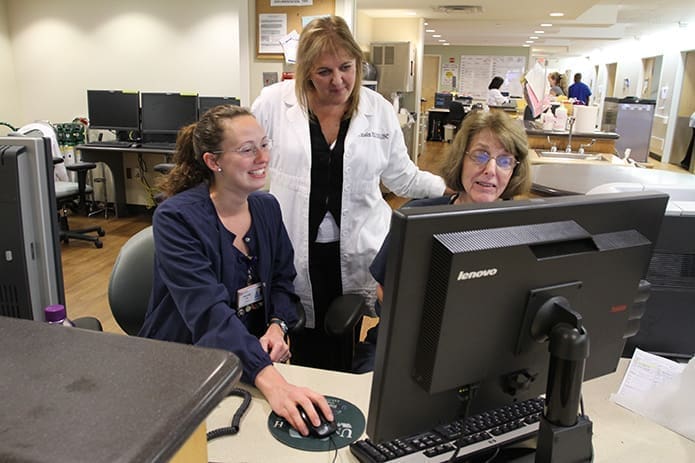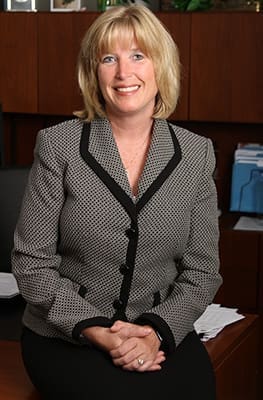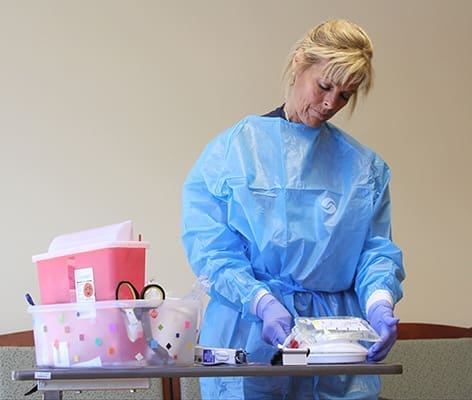 Photo By Michael Alexander
Photo By Michael AlexanderAtlanta
Magnet award for nursing excellence given for fifth time to Saint Joseph’s Hospital
By LINDSAY GLADU, Special to the Bulletin | Published July 24, 2014
ATLANTA—No one enjoys being sick or stuck in a hospital bed.
But the nursing staff at Emory Saint Joseph’s Hospital work hard to ensure their patients have the best experience and best care possible.

Joyce Soule is the chief nursing officer at Emory Saint Joseph’s Hospital, Atlanta. The hospital recently received a Magnet designation, an American Nurses Credentialing Center honor reserved for excellence in hospital nursing. Photo By Michael Alexander
That’s why the hospital is being recognized with its fifth consecutive Magnet designation, an American Nurses Credentialing Center honor reserved for excellence in hospital nursing.
Saint Joseph’s was the third hospital in the world to receive this award in 1995, and has since maintained the rigorous standards imposed by the Magnet Recognition Program to continue earning the honor every four years.
It is one of only three hospitals in the world and the only community hospital to receive the designation five times.
There are now 401 hospitals in the world with the Magnet designation.
The presence of the Sisters of Mercy has been a boon to the hospital, too.
Sister Rosemary Smith, the chief mission officer at the hospital, is responsible for overseeing that Saint Joseph’s mission statement is shown in every aspect of care.
“We want to give tangible expression to Christ’s love by providing clinically excellent health care in the spirit of loving service to those in need, with special attention to the poor and vulnerable,” Sister Smith said, quoting the hospital’s mission statement. “That calling has really taken root here.”
It’s the calling for compassionate care that draws nurses from all backgrounds and religions to work at Saint Joseph’s.
Michelle Vazquez, a registered nurse in the cardiovascular intensive care unit, knew early on in nursing school that Saint Joseph’s was where she wanted to begin her second career. July 2014 marks her two-year anniversary as a nursing staff member.
“The Sisters of Mercy have definitely instilled a set of values,” Vazquez said. “It was very clear that Saint Joseph’s had something very different going on.”
What makes the hospital different is something called shared governance, a concept that allows nurses more autonomy in patient care decision-making. A shared governance system within hospitals gives nurses the ability to actually practice bedside medicine and research.
For instance, a group of nurses noticed that patients were sleeping poorly. So they distributed earplugs to the patients. While it sounds like a simple solution, it makes a world of difference for patients who need adequate rest to heal their bodies.
Michele Chisolm, the orthopaedic and complex medical surgical unit director, has seen Saint Joseph’s shared governance program take communication, teamwork and critical thinking to the next level in the 24 years she’s been an employee there. All of the hospital’s units meet regularly to discuss problems and resolutions within inpatient and outpatient care to break down barriers that may affect patient care outcomes.
“We share all of our issues together so that we can make one decision on them,” Chisolm said.
‘They go above and beyond’
Being a part of a Magnet hospital often means more work, but the nurses at Saint Joseph’s say it comes with the territory.
Janet Hersh, who is the shift nurse manager for the cardiovascular intensive care unit, has worked at the hospital for 37 years and loves being a part of the Saint Joseph’s culture.
“It truly is an amazing place,” she said. “There’s not a day that goes by that I don’t see people do amazing things for patients. They come in after hours to visit them. They go above and beyond.”

Debbie Yang, a registered nurse in the hospital’s oncology unit, demonstrates how she and her colleagues weigh the IV pumps on a scale to ensure patients receive their full dosage of medication during chemotherapy treatment. Photo By Michael Alexander
Nurses at Saint Joseph’s are given the opportunity through the hospital’s scholar program to take time away from their rounds and to critically think about solutions for their patients.
For example, nurse Debbie Yang and her colleagues noticed some of their patients were coming back from a chemotherapy facility with chemotherapy medication still left in the IV pump bags. Since chemotherapy is based on a patient’s weight, Yang knew it was imperative that each patient receive the full dose. So she decided to keep a log with the correct dosages and reprogram the pump to ensure the full benefits of the treatment for her patients.
Now there is a policy in place at Saint Joseph’s to check each patient’s IV pump bag to make sure the patient is getting all the medication.
Even the Chief Nursing Officer Joyce Soule will spend time on the hospital floor “in the trenches” to better understand what the day-to-day barriers are within her facility.
“When our nursing team is looking to find solutions, they look at the problem, and not only the solution that’s going to work for today,” Soule said. “They tend to look out and think what is this problem going to look like several years from now.”
It’s this visionary component that keeps earning Saint Joseph’s Hospital the Magnet designation for nearly 20 years.
To earn a Magnet designation, hospitals must pass 89 sections of criteria from patient outcomes to nursing job satisfaction to leadership and structure within the health care establishment. Every four years, the American Nurses Credentialing Center raises the bar in its requirements for designation.
The organization says that the process leads to lower mortality rates and lower hospital-acquired infection rates, as well as higher patient satisfaction and higher job satisfaction among nurses.
This year, Saint Joseph’s Magnet Program Director Sarah Hall-Shalvoy turned in “six binders of goodness” with 1,190 different files to illustrate how the hospital is still meeting the Magnet Recognition Program’s requirements.
Once the application is reviewed, representatives from the program schedule a hospital visit to speak with the administration and staff. The designation committee interviews nurses and doctors, tours departments and asks questions not only about health care, but also about community outreach and patient education. Interdisciplinary teamwork also is crucial to receiving the Magnet award.
The designation shows that “what nurses do on a daily basis matters,” Hall-Shalvoy said.
“If you have nurses who have the support and leadership they need, then care is much better for the patients,” she said.
Over Sister Peggy Fannon’s 41 years at Saint Joseph’s Hospital, she’s seen the Catholic hospital continue its legacy of quality care since it opened its doors in 1880. Its Magnet designation is only the tip of the iceberg for the ministering medical facility.
“I do believe that there’s a spirit here that people do not experience in other facilities around the city,” Sister Peggy, a registered nurse and education specialist, said. “It’s not only nurses, but it’s the nursing techs and the doctors who know because we are a Catholic hospital that it’s a little different here. They reach out. They’re more compassionate.”